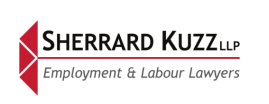
New Work Refusal Rules under Canada Labour Code
by Stephen Shore / Sherrard Kuzz LLP
October 2014
As a result of amendments to the Canada Labour Code, effective October 31, 2014, a worker employed by a federally regulated employer may no longer be able refuse to perform work on the basis he or she believes the work involves potential hazards or could cause injury or illness at some point in the future. Instead, a worker must be able to demonstrate the hazardous condition or activity could reasonably be expected to cause an imminent or serious threat to his or her life or health.
The requirement of “immediacy” and a “present threat” is anticipated to limit the number of work refusal disputes in a workplace.
The procedure for responding to a work refusal will also change, shifting greater responsibility into the hands of the workplace parties. Currently, a work refusal triggers a Ministry of Labour investigation into the allegedly unsafe work and, if appropriate, the legitimacy of the worker’s exercise of his or her work refusal right.
Post October 31, 2014, the employer must first conduct an internal investigation, with worker participation. If the parties can resolve the dispute, the process ends there. If there is no resolution, a referral must be made to the Ministry for further investigation.
As a result of these amendments it is important that federally regulated employers ensure their supervisors and managers are aware of the new rules and trained in how to respond to a work refusal. Employers should also review and update their internal investigation protocols to ensure compliance with the new requirements.
To learn more and for assistance implementing a training and investigation protocol tailored to your workplace, contact a member of Sherrard Kuzz LLP.
The information contained in this article is provided for general information purposes only and does not constitute legal or other professional advice. Reading this article does not create a lawyer-client relationship. Readers are advised to seek specific legal advice from Sherrard Kuzz LLP (or other counsel) in relation to any course of action contemplated.

